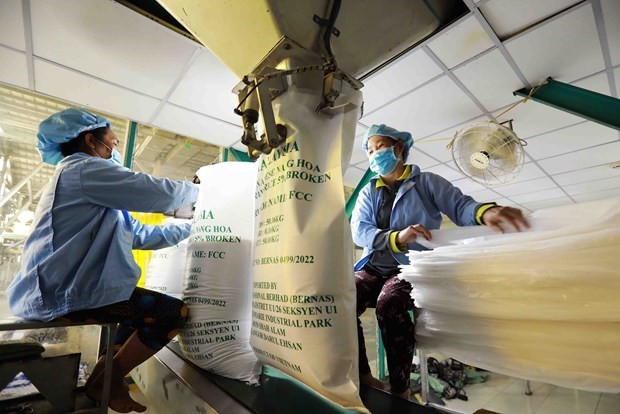A delegation of the Ministry of Industry and Trade (MoIT) led by Deputy Director of the Ministry’s Agency of Foreign Trade Tran Quoc Toan and representatives from 19 Vietnamese rice exporters have paid a working visit to Beijing, China to promote Vietnamese rice in the market.
 |
Workers pack rice for export. (Photo: VNA) |
During the visit, the Vietnamese delegation worked with representatives from the Ministry of Commerce of China, the China Animal Agriculture Association, and Xinfadi Group and visited the Vietnam Trade Office in China.
According to the MoIT, in the structure of exports from Vietnam to China, rice shipments have seen good growth in recent years, accounting for nearly one-fifth of China's total rice imports. In 2022, Vietnam's rice exports to China reached 834,200 tons, worth US$423.2 million.
In the first nine months of 2023, China imported nearly 869,000 tonnes of rice from Vietnam, an increase of 41.1 percent over the same period in 2022.
Notably, Vietnam is capable of supplying popular rice varieties in China and has established long-term traditional partnerships.
Vietnamese rice exporting businesses always recognize that China is an important market, ranking 2nd among Vietnam's rice importers, thereby constantly making efforts to improve product quality and packaging to better meet the regulations, demands, and tastes of Chinese consumers.
To consolidate the trade relations between the two countries in general and their rice trade in particular, especially for the Northern China area, the delegation proposed and reached an agreement with Chinese agencies, associations, and agricultural and food businesses, especially Chinese rice businesses.
Specifically, the two sides will strengthen trade support and establish information exchange channels to jointly solve arising issues and promote Vietnam's rice exports to China.
Besides, they will consider signing memoranda of understanding to promote exports and trade promotion between the two countries while supporting Vietnamese rice products to enter deeply into China's traditional retail and e-commerce channels.
























